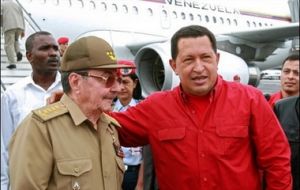MercoPress. South Atlantic News Agency
Castro and Chavez criticize US at alternative trade summit in Cuba
 The two leaders at La Habana airport
The two leaders at La Habana airport Cuba's President Raul Castro and Venezuelan leader Hugo Chavez have criticised the US during a key alternative trade summit in Havana. Castro accused the US of treating Latin America as its “backyard” and denounced a deal giving US armed forces access to Colombian military bases.
Meanwhile Chavez said US criticism about Latin America's relationship with Iran was an “imperial offensive”.
Both were speaking at the opening of the left-wing Alba summit in Havana.
A regional political and economic bloc, the Bolivarian Alliance for the Peoples of America (Alba), was founded five years ago as a radical alternative to America's free trade policies in the region.
The BBC's correspondent in Havana Michael Voss says Castro's harsh rhetoric was reminiscent of the Cold War. It could be a signal that ties between Cuba and the US might be taking a turn for the worse.
Castro said: “On the one side, there's an exploitative model of dependence subordinated to the interests of the empire, on the other, the advance of revolutionary and progressive forces, representing the disposed.”
Castro said President Obama had carried out a hegemonic offensive with the Colombia deal. He also criticised Washington for presiding over what he described as “an electoral farce” in Honduras.
He said the country's people ”have been deprived of their constitutional rights and there has been imposed, with the support of the US administration and a coup-led government (in Honduras), an electoral farce“.
Shortly afterwards Chavez openly rejected a warning made by US Secretary of State Hillary Clinton on Friday that Latin American countries needed to ”think twice” about fostering a relationship with Iran.
A day earlier Castro and Chavez are signed economic co-operation deals worth 3.2 billion US dollars. The documents cover 285 accords in areas including energy, sport and technology.
The new deals will give Venezuela a greater involvement in oil exploration off the Cuban coast. Cuba also agrees to buy more than 400 million USD worth of Venezuelan goods, including food, tyres and clothes.
The island has suffered a sharp decline its revenues from tourism as well as mineral and tobacco exports. Last year trade between the two countries was at around 5.26 billion USD last year, the Reuters news agency reported. (BBC).-




Top Comments
Disclaimer & comment rulesCommenting for this story is now closed.
If you have a Facebook account, become a fan and comment on our Facebook Page!